Atlantic Monthly Contributors's Blog, page 862
December 6, 2013
The Faulty Science of the Abortion-Breast Cancer Link
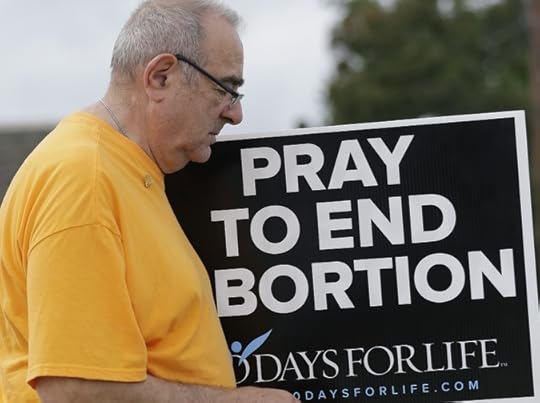 AP
AP In five U.S. states, physicians are required by law to tell women seeking an abortion about a possible link between induced abortion and increased rates of breast cancer. But there's just one problem: from a standpoint of scientific consensus, that link is mainly bunk. It is, however, a persistent theory, as a round of conservative press promoting a new study on the subject demonstrates. The paper, published recently in the Cancer Causes Control journal, looked at the results of 36 studies in China on what activists have nicknamed the "ABC Link," concluding that women who undergo an induced abortion demonstrate a dramatically increased risk of breast cancer. The Wire asked an epidemiologist to look at the results, just in case the theory finally had the breakthrough it's been waiting for. (Spoiler alert: it hasn't).
First, some background: the ABC link idea first got going in the 1980s, in the wake of Roe v. Wade. As Slate tells it in an extensive look in the theory, those tentatively proposing a possible link based it on an observation: following the Supreme Court's decision ensuring women have access to abortion, the rates of breast cancer skyrocketed. Although a few early studies seemed to indicate that there could be a link between breast cancer and abortion, further, thorough, inquiries into the subject concluded that such a link stood on extremely shaky evidence.
But the idea is appealing, especially among those who viewed a perceived "epidemic" of breast cancer among young, sexually-active women as a punitive result of the Roe v. Wade decision. In fact, as Patricia Jasen explains in a survey of the political and historical context of the ABC link research, that initial observation of an increased rate of breast cancer among American women is likely due to more sophisticated early detection methods that coincidentally gained traction during the post Roe v. Wade period.
This is the context of today's advocacy on the ABC theory. A handful of scientists, such as Joel Brind, a professor of biology and endocrinology at Baruch College in New York, have dedicated their careers to finding ways to prove the link. Brind worked hard to promote the recent Chinese study, claiming that the only reason the ABC link hasn't caught on is because of a vast conspiracy to suppress it. The groups working against the theory, he writes, include:
"'mainstream' abortion advocates entrenched in universities, medical societies, breast cancer charities, journals, and especially, government agencies like the National Cancer Institute (In reality, the NCI is just another corrupt federal agency like the IRS and the NSA.)."
The recent study is not by Brind himself, but by Dr. Yubei Huang et al., whose meta-analysis of 36 Chinese studies concludes that induced abortions increase the risk of breast cancer by 44 percent. For women who have had two abortions, the study claims an increased risk of 76 percent. Those are dramatic numbers. So, what's going on?
Most of the studies use a notoriously misleading method"The findings of this meta-analysis should be viewed with caution," Dr. Susan Gapstur told The Wire in an email. Gapstur is the vice president of epidemiology at the American Cancer Society. She notes that almost all of the studies cited in Dr. Huang's analysis used something called the case-control method, which tends to produce misleading results. In the case of the abortion-breast cancer link, women with breast cancer who self-report their reproductive histories tend to do so more accurately than women who are cancer-free. And in countries like China, where abortion still carries a significant stigma, that "recall bias" can be reinforced. "This 'recall bias' can make it look like breast cancer is associated with abortion when it is not," Gapstur explains. Case-control methods, it should be noted, have produced links between breast cancer and induced abortion before.
The best studies of the bunch found no linkAll but two of the studies included in Huang's analysis used the case-control method. The remaining two were prospective cohort studies, which track women over time, instead of relying on self-reported historical results. Those two studies, Gapstur notes, did not find a link between abortion and breast cancer. In fact, the eight studies that appear to be the most reliable of the group found no link between induced abortion and breast cancer risk. "The association only became apparent as the quality of the studies decreased," Gapstur told The Wire, noting that some of the included studies were not published in peer-reviewed publications. In other words, the work might not be vetted by independent professionals in the field.
The ABC link controversy is political, not scientificVirtually no reputable scientific institution endorses the ABC link, because the controversy surrounding it has little to do with any room for debate in the data. Inquiries into the subject by the National Cancer Institute, the American College of Obstetricians and Gynecologists, and the Collaborative Group on Hormonal Factors in Breast Cancer based out of Oxford University in England, for instance, have found no evidence of a link between breast cancer and abortion, based on high-quality studies produced on the subject. The American Cancer Association has an explainer on the controversy, clarifying that "the scientific evidence does not support the notion that abortion of any kind raises the risk of breast cancer or any other type of cancer."
Based on the evidence, the ABC link should not be one of the divisive elements circling closely to today's debate on abortion. And medical professionals certainly should not be required by law to discuss it as a valid theory. There's a reason the media, and the scientific community at large have ignored studies like these, and it has nothing to do with a cover-up. It's just bad evidence.












Good News: Unemployment Drops to 7 Percent
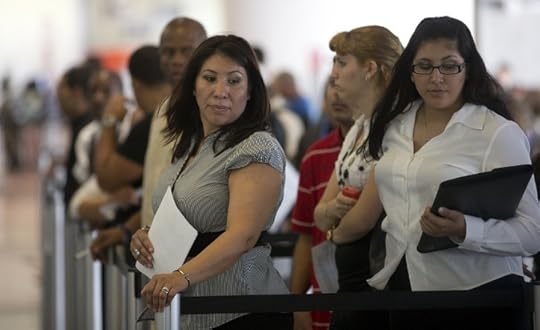 Norma Urbario, left, and America Rodriguez stand in line, holding their resumes, during the job fair that the Miami Marlins hosted at Marlins Park in Miami in 2012. (ASSOCIATED PRESS)
Norma Urbario, left, and America Rodriguez stand in line, holding their resumes, during the job fair that the Miami Marlins hosted at Marlins Park in Miami in 2012. (ASSOCIATED PRESS) The U.S. economy added 203,000 jobs in November as the unemployment rate dropped to 7 percent, according to the the Labor Department's last jobs report of the year. That is the lowest unemployment percentage since November 2008.
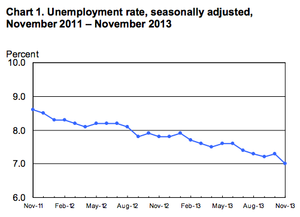
The figures beat estimates on both counts: economists expected to see 180,000 new jobs in November, and a more modest drop in the unemployment rate.
Among the fastest growing sectors in November were transportation and warehousing, which went up 31,000 and healthcare, which added 28,000 jobs. Government employment continued its long decline.
One indicator to which economists have been paying particularly close attention is the number of long-term unemployed, those who've been out of work for 27 weeks or more. That figure didn't change much in November, including 4.1 million people — or about 37 percent of the unemployed population. Democrats have made an extension benefits for this group a pivotal part of on-going negotiations over the budget.
There is often variability with the data month-over-month, but revisions to previous reports were small. September's numbers were increased by 12,000 new jobs to 175,000; October's were lowered by 4,000 to 200,000.












The Best 11 Months of the Year to Release Music If You Want It on a Year-End List
 Photo by Vespa via Shutterstock.
Photo by Vespa via Shutterstock. Britney Spears's brand new Britney Jean likely won't crop up on any notable album-of-the-year lists. That's in part because it's, by most critical accounts, a rather dreadful record; one takedown, by Vulture's Jody Rosen, calls Spears "antimatter in a belly shirt" and "[maybe] the most boring person on the planet," and that's one of the kinder ones.
But Britney Jean probably never had much of a shot to begin with, because the major lists have already been published, in more than a few instances.
Consider the record's release date: November 29. That was last week. When the big publications start unveiling their year-end lists at the very start of December (thus finalizing them the week or two prior), virtually any album released between mid-November and New Years Day lands in a critical dead zone.
And so it's been in 2013. SPIN's refreshingly unpredictable list arrived Monday, as did Paste Magazine's. The next day, Stereogum and Rolling Stone followed suit. So did NME and Buzzfeed (if you count the first of presumably several genre-based lists). The AV Club's picks arrived yesterday. Today's date, recall, is December 6. Even by recent standards, that's mighty early, and critics have noticed:
So, my best (favorite) albums of 2013 list isn't going up until mid-December, which is like May 2014 in music-media time.
— Steven Hyden (@Steven_Hyden) December 4, 2013
Can't wait to see all of your best albums of December 2013 lists.
— Dave Segal (@editaurus) December 5, 2013
We all know we compile the lists well in advance, but come on, it's not a race.
— Andrew Ryce (@andrewryce) December 4, 2013
Perhaps the collision of the start of December and the first week back from Thanksgiving made for too convenient timing to ignore. Then there's the promise of a lengthier December vacation, for critics and publicists alike. But also, of course, it has become a race.
And it hasn't always been this way. As recently as 2005, SPIN published its list on December 31, in the weaning hours of the year (though the print issue was out by then); Pitchfork did the same. And just a decade ago, a December release for a big record wasn't all but unheard of. That month in 2003, for instance, saw the arrival of The Diary of Alicia Keys, Ryan Adams' Love Is Hell Pt 2, Ruben Studdard's Soulful (remember—this was 2003). Such timing today seems a prehistoric relic.
So what's the solution? Ban December album releases altogether (these days there are fewer and fewer)? Push the lists forward until they land on Halloween? Tabs Out Podcast, a noise- and experimental-focused podcast (which kindly inspired this headline), prompts a better idea. Just rename the damn lists:
Humbly, then, we invite publications (the few that haven't already gone live with their picks) to employ more precise language. In that spirit, what are your favorite albums of the first 11 months of 2013?Top 11 Months To Release Music If You Want It Listed On A Year End List.
— Tabs Out Podcast (@tabsout) December 2, 2013












December 5, 2013
23andMe Suspends DNA Testing After FDA Complaint
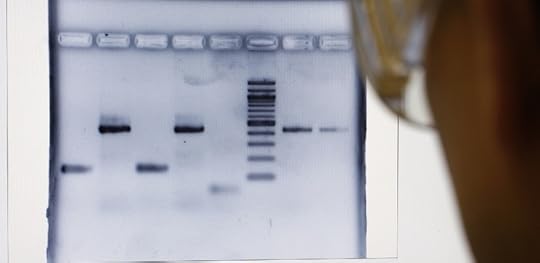 Reuters
Reuters DNA sequencing company 23andMe has decided to suspend its testing services following a complaint from the Food and Drug Administration questioning the accuracy of the service and its effects on self-diagnosis.
After halting all sales of its DNA kit, the service is now also halting testing on any kits purchased after November 22. In a blog post, 23andMe founder Anne Wojcicki explained the situation:
I am highly disappointed that we have reached this point and will work hard to make sure consumers have direct access to health information in the near future. Our goal is to work cooperatively with the FDA to provide that opportunity.
We also want to make clear that we stand behind the data we have generated for customers. Our lab partner adheres to strict quality standards that are part of the Clinical Laboratory Improvement Amendments of 1988 — known as CLIA. These are the same standards used in the majority of other health and disease-related tests. We decided several years ago to comply with CLIA guidelines to be consistent with other types of laboratory testing and to assure customers about the quality of data.
Wojcicki claims that their tests are more than 99.9 percent accurate. In addition, customers who purchased a kit before the company received their warning on the 22nd will be entitled to a full refund. Those who did so prior will still be able to access all of their test results.
This is a stoppage of testing analysis, not a complete lockdown on the service. According to The Verge, customers who bought a kit after the warning will still receive ancestry information and raw results, but no interpretation of those results.












U.S. Won't Recognize China's Air Defense Zone, Says Biden
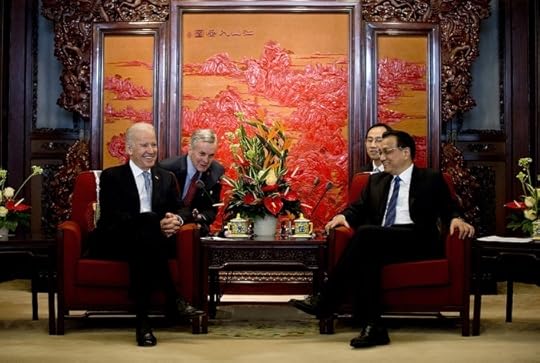 U.S. Vice President Joe Biden, left, chats with Chinese Premier Li Keqiang during their meeting at the Zhongnanhai leadership compound in Beijing. (AP)
U.S. Vice President Joe Biden, left, chats with Chinese Premier Li Keqiang during their meeting at the Zhongnanhai leadership compound in Beijing. (AP) Speaking in Seoul on Friday, following his meeting with Chinese leadership, Joe Biden said that the United States would not recognize Chinese jurisdiction over an air defense zone they established in the East China Sea.
Biden told reporters in a speech:
I was absolutely clear on behalf of my president: We do not recognize the zone. It will have no effect on American operations. None. Zero.
Biden's remarks echo the declaration made by White House Press Secretary Jay Carney earlier in the day, when he said, "We, the United States, do not recognize and we do not accept it, and will not change the way the United States conducts military operations in the region."
The U.S. is obviously reluctant to get dragged into any military conflict with China, despite the fact that they have a treaty with Japan to assist in protecting Japanese-controlled territory. Still though, Biden's comments leave little room for interpretation as to whether they plan on ceding to Chinese territory claims.
Now the ball appears to be in China's court as to whether or not they will enforce regulations that require all flights through the disputed area to be cleared with Chinese authorities beforehand. Chairman of the Joint Chiefs, General Martin Dempsey, said that military operations in the region would remain unchanged.












BlackBerry Missed Out on Bieber Fever
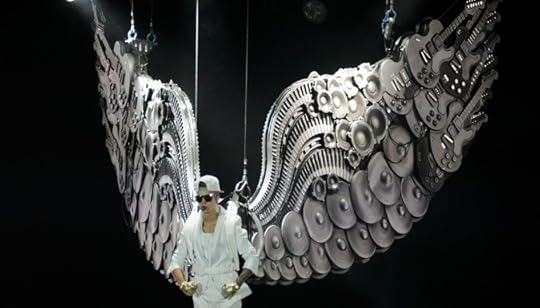 In an alternate reality, Justin Bieber descends from on high to save BlackBerry from itself. (AP)
In an alternate reality, Justin Bieber descends from on high to save BlackBerry from itself. (AP) A new oral history of BlackBerry—formerly RIM, the Canadian smartphone pioneer—reveals a number of anecdotes about how the company got to its current state, now mostly known for bringing up the rear in the smartphone market.
One of the best moments comes from Vincent Washington, an employee of the company for a decade beginning in 2001, in which he says that the company turned down Justin Bieber as a spokesperson:
One thing we missed out on was that Justin Bieber wanted to rep BlackBerry. He said, “Give me $200,000 and 20 devices, and I’m your brand ambassador,” basically. And we pitched that to marketing: Here’s a Canadian kid, he grew up here, all the teeny-boppers will love that. They basically threw us out of the room. They said, “This kid is a fad. He’s not going to last.” I said at the meeting: “This kid might outlive RIM.” Everyone laughed.
How different would the world be if this came to fruition? Imagine all of those teens the company could have lured into their userbase. Imagine Justin Bieber's ridiculous new selfie app launching on BlackBerry first. Imagine him singing an REO Speedwagon cover about SDKs. If only!
But BlackBerry did manage to find another celebrity endorsement. Although, the company's hiring of Global Creative Director Alicia Keyes has apparently not been doing much to help their bottom line: the company plans to lay off 40% of its employees.












Don't Worry, Americans: Obama Says the NSA 'Does a Very Good Job' of Not Spying on You
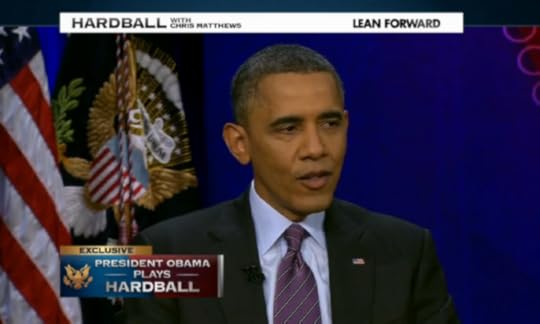 Screenshot / MSNBC
Screenshot / MSNBC President Obama sat down with passionate fan and MSNBC host Chris Matthews tonight for an interview that was either "crucial" or "fairly insignificant," depending on who you read.
Though Matthews said he would ask Obama some "easier questions," he touched on the NSA -- specifically, the latest Washington Post revelation that the agency gathers almost 5 billion records per day to track cell phone locations.
No surprise here: Obama defended the NSA's work on the grounds that it'll protect us from "bad actors" and "people who are trying to hurt us."
But he also admitted that the "Snowden disclosures have identified some areas of legitimate concern," although other areas were "highly sensationalized and [have] been painted in a way that's not accurate."
That said, we shouldn't get too upset about the fact that the NSA can access basically all of our electronic communications that we thought were private, because Obama says they don't want to. Despite all evidence to the contrary.
"The NSA actually does a very good job about not engaging in domestic surveillance," Obama said. "They are not interested in reading your emails. They are not interested in reading your text messages."
And if you aren't in America, well, all bets are off. "Outside of our borders, the NSA is more aggressive," Obama said. "It's not constrained by laws." Oh. Sorry, Merkel.
As for those "areas of legitimate concern," Obama said, he is going to use the results of an "independent review" of the NSA's tactics to propose "some self-restraint" and "initiate some reforms" in the next month or two.
Obama said he still believes "we've got a big system of checks and balances, including the courts and Congress." Do you?












From Mary to Carrie: A Brief History of Maria Von Trapps
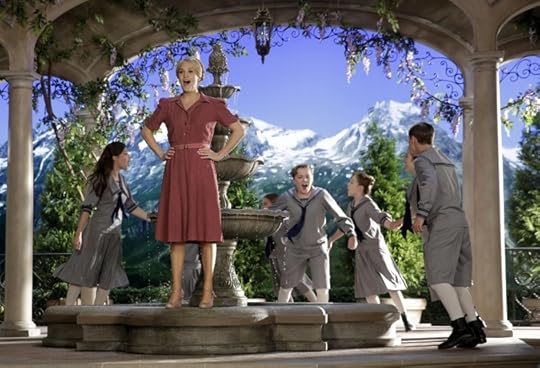 AP/NBC
AP/NBC In NBC's live production of The Sound of Music tonight, Carrie Underwood may be taking on the role popularized by Julie Andrews in the 1965 Oscar winning film version, but in the grand history of Rogers and Hammerstein's musical, it's not just Carrie versus Julie. Plenty of actresses have taken on the role of Maria von Trapp, from Broadway vets to future TV moms to Mormon pop stars. How do you solve a problem like Maria? With some of these ladies.
Mary MartinThough Julie Andrews may live on in the popular memory, the original Maria was of course Mary Martin, a legend of the Broadway stage, who originated many of of the genre's classic heroines. (And, well, heroes. She played Peter Pan.) And though the choice of Carrie Underwood may have seemed off to some—like, well, us—the first Maria also had roots in the South. Martin was from Texas.
"Although Miss Martin, now playing an Austrian madien, has longer hair than she had in 'South Pacific,' she still has the same common touch that wins friends and influences people, the same sharp features, goodwill and glowing personality and the same plain voice that makes music sound intimate and familiar," Brooks Atkinson wrote in his review for the New York Times in 1959. Though his review was mostly positive, Atkinson was quite not as kind to the show in general, seeing it as a step backwards for Rogers and Hammerstein.
Here, Martin accepts her Tony for the part. You can hear her sing here.
Florence HendersonYes, the mom from The Brady Bunch took on the part in the national touring company production in 1961. The run was canceled early on the day after the assassination of JFK in 1963. Here is a picture of Henderson rehearsing from the Associated Press:
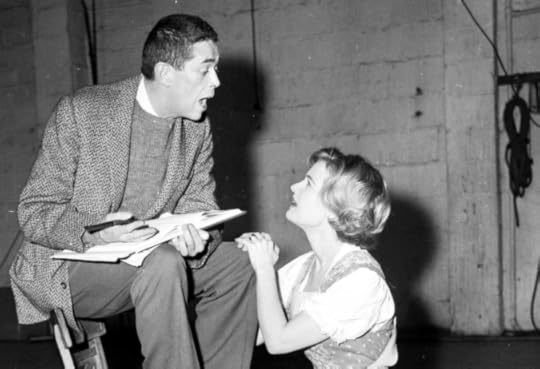 Julie Andrews
Julie Andrews The ultimate Maria: refined, yet spunky. And that voice. Andrews got her Broadway break in 1956's My Fair Lady as flower girl Eliza Doolittle, a role she was encouraged to take by Sound of Music authors Rogers and Hammerstein. She would work with the duo a year later in the televised production of their Cinderella. The part of Eliza in the film version of Lerner and Loewe's Pygmalion adaptation eventually went to Audrey Hepburn, but the same year, 1964, Andrews would star in Mary Poppins, and take the Oscar. The next year came The Sound of Music.
Petula ClarkAt the age of 49, British star Clark was definitely an older Maria when she played the role in the 1981 London revival, but that didn't seem to curb the praise for her performance. In fact, it's widely reported that the real life Maria, who saw the opening night performance of the show, called her the "best Maria ever." One review said: "Petula Clark, an artist who has suffered under the spectre of ageism ever since she was announced for the role of Maria, overcomes it in a way that should make her critics feel ashamed of themselves and gives a spoken and sung performance that is the very essence of youthful high spirits laden with indecision, bringing her own individuality to the songs."
Marie OsmondGaining a strange place on this list is none other than famous sibling Marie Osmond. Why? Well, she was the Maria this writer saw on stage when she was a little girl in the mid-1990s. The Los Angeles Times's Laurie Winer said Osmond looked "like Barbie come to life."
Rebecca LukerWhen the production returned to Broadway in 1998, Rebecca Luker took on the role. "Although she pays homage to the most famous of Marias with a few of those bewildered hands-on-the-head gestures that were Ms. Andrews's signature, she doesn't try to match her predecessor's starched poise," Ben Brantley wrote in the New York Times in his review. "If Ms. Andrews was the dream governess, Ms. Luker is much more a girl's girl, and when she romps with her young charges, she seems like one of the gang. This persona doesn't provide the solid charismatic anchor that Ms. Andrews brought to the film, but it does allow Maria to grow visibly into adulthood when she falls in love with the Captain." Luker's understudy and later replacement was Laura Benanti, who plays Elsa in the live production tonight.
Carrie UnderwoodTonight we'll finally see what Underwood does with the role. Will she be great and force us to bite our tongues? Or will she perform to admittedly lowered expectations? Here's a video of her performing the title song.
Bonus: Judi Dench as LieslOkay, okay, this isn't a video that involves Maria, but it may be the best Sound of Music-related video ever. Here's Judi Dench in the pretty recent past singing Sixteen Going on Seventeen at a gala. All hail Judi, the best Liesl.












The Greatest Trick Trump Ever Pulled Was Telling You Republicans Wanted Him to Run for Anything
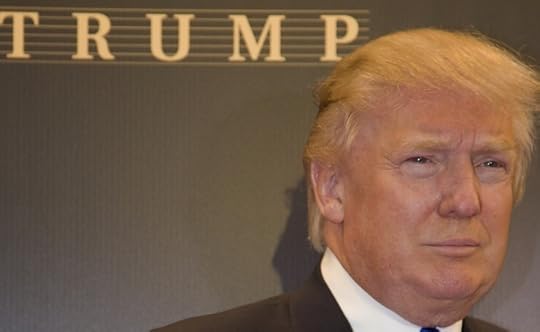 AP
AP Sometime within the next year, it won't be surprising if perpetual pretend politician Donald Trump tells us that he's letting plenty of Republicans down and has decided not to run for governor of New York — a fitting end to a draft campaign that he allegedly started himself.
For the last month or so, there have been whispers of Trump being seen as the Katniss Everdeen of the New York GOP — the only person who could take down the brutal and powerful regime of Democrats and Gov. Andrew Cuomo. Trump even had a meeting with Republicans on Wednesday. "There is only one prospective candidate who could run on the GOP line and win against Cuomo in 2014 — Donald Trump," a leaked memo from Rochester-area Assemblyman Bill Nojay declared.
That's pretty flattering stuff, so flattering that it seems like Trump wrote it himself. According to Capital New York, he sort of did. Capital reports that one of his closest aides, Michael Cohen, actually circulated this supposedly organic Republican idea of a Trump gubernatorial run:
A senior G.O.P. official told Capital that Trump first reached out to Republican State Chairman Ed Cox in mid-October, but was rebuffed.
Trump aide Michael Cohen “called and said he wanted to get his name out there, and asked if Ed would say nice things about him if asked,” said the official, who was briefed on the conversation. Cox told Trump to show he was serious by placing his assets in a blind trust and depositing several million dollars in a campaign account. Trump, unsurprisingly, did not. Cohen then called Cox this week and asked him to attend Wednesday's meeting, but Cox demurred.
Mid-October is some curious timing. The "leaked" memo that Nojay circulated was published around October 14. Around that time The New York Post reported that Trump "only recently learned of the effort", even though Cohen is one of his closest aides.
Fast forward to Wednesday, and there's been a slight change in tone from Trump, who is now allegedly warming up to the idea of running for political office again. Trump softened from having no interest in a gubernatorial run to (surprise), being open to meet with Republicans again. If Capital's source is solid, the whole thing is not unlike Clueless when Cher sends herself fake flowers to get someone else interested in her (and it wouldn't be the first time that Trump has reminded us how many people are really interested in him).
Despite all this posturing and flattery, it doesn't sound like Cox, the Republican chairman, is very impressed. "Donald is a very astute observer of politics. He's very good in public relations. He has numerous interests, of course," Cox told Capital.












Republicans Are Prepared to Take a Close Look at This 'Hillary' Person
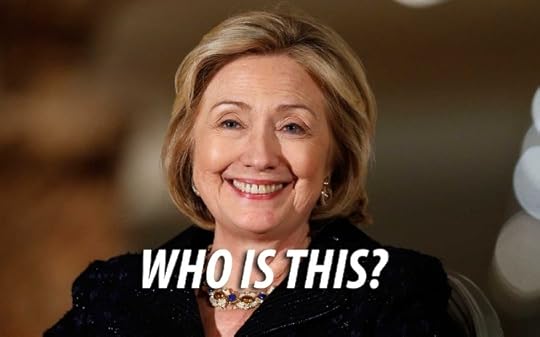 AP
AP Republican Party Chairman Reince Priebus confirms that, yes, the GOP has begun doing research for a possible race against Hillary Clinton, Politico reports. We can add to that scoop: According to our sources, that effort actually is already underway, having begun in 1991 when Bill Clinton announced his presidential candidacy.
This is what Priebus told radio host Hugh Hewitt:
"[O]ur research shop, along with [opposition research firm] America Rising, has been focusing in on Hillary Clinton. But I agree with you that there needs to be a more of a focus. … I think that we have to be very aggressive on what she’s done or hasn’t done."
First of all, the idea that the Republican Party needs to put more of a focus on the Clintons and Hillary in particular is a bit strange. Both because she isn't (officially) a candidate for anything, but also because there are already almost 100 mentions of Hillary on the GOP's website this year alone. That seems pretty aggressive?
But this idea that they need to do more research is really something. The Clintons are to the GOP what Fidel Castro was to the United States: a foe that outlasted leader after leader after leader. The idea that Reince Priebus must now convene a group of experts to try and come up with attacks on Hillary is an amusing one. Just as Barack Obama could be handed a 19-inch-thick manila folder with the CIA's analysis of the former Cuban dictator, Priebus can simply open the folder on the GOP's server labelled "H. Clinton" and peruse Word documents pre-dating the internet.
Priebus wonders what she has / hasn't done? Come on, man. The Republican Party was almost certainly doing opposition research on Hillary Clinton in 1991. And of course, 1992. Also: 1993, 1994, 1995, 1996, 1997, 1998, 1999, 2000 (for her Senate position), 2001, 2002, 2003, 2004, 2005, 2006, 2007, 2008 (for her presidential bid), 2009 (State Department nomination), 2012 (Benghazi Benghazi Benghazi), and 2013.
So, maybe not 2010 or 2011? Earlier this year, we put together a documentation of the scandals, both serious and idiotic, that emerged during the Clinton presidency. We did this by searching our own files, stored at a site called "Google.com." Could help fill in those mysterious two years.
This is basically Priebus trying to rally the troops, get funders stoked about the upcoming battle with the party's long-term nemesis. Or so we assume. Either way, we're looking forward to the result of Priebus et al's deep dive into this mysterious "Hillary" person. Should be illuminating.












Atlantic Monthly Contributors's Blog
- Atlantic Monthly Contributors's profile
- 1 follower



